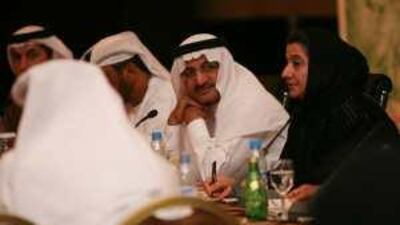Schools are facing a breakdown in discipline, parents and teachers personally warned the Minister of Education. At an open forum on Wednesday night in Dubai, the minister, Humaid al Qattami, was told that children's education was suffering as a result, with behaviour problems, rampant cheating and a lack of respect for teachers among the many issues.
Some put the decline down to parents' busy work schedules, lack of interest in their children's grades and Emiratis marrying spouses who do not speak Arabic, and therefore do not become involved in school affairs. Others, however, said the problem was a lack of interest by schools, which in some cases discouraged parents from becoming involved. Mr al Qattami said the answer to many of the parents' and teachers' concerns lay in greater co-operation between parents and schools.
Without that, he said, "it would be difficult to expect a positive result among our students in terms of learning or in values and behaviour". He also promised that schools would hold open days each term for parents and teachers to discuss school policy and children's performance. Nawal Yousef, a mother of two who also represents the Fujairah Women's Council at Umm al Ola School, said that discipline had become a major problem.
"All places are now complaining about the behaviour of students," she said. "When a teacher goes in [to school] they treat them as someone they meet in the streets, joking and laughing at them, in a rude way. The teacher no longer has any value with them." She said it was crucial for parents to be able to track their children's behaviour, and be made aware of disciplinary concerns before they became serious problems.
"I want to know what my children are doing," she said. "Some schools in Fujairah don't tell you anything about your children and then [parents] are shocked by some of the things their children do. "The schools don't tell us anything. They don't give any importance to the parents. "We want there to be a strong relationship between the school and parents - in most schools there are no visits or relationship, and there is neglect."
Another problem, she said, was rampant cheating, with students copying material from the internet into their assignments. "When a teacher sees the same paper submitted by all students, they shouldn't accept it." Aisha Ishak, a Dubai parent, also complained about a lack of discipline. "We hear a lot about strange behaviours by students in schools, such as friction with teachers, and violence," she said.
She said that teachers were ill-equipped to rein in the students, because they are trained to teach but not to cope with unruly pupils or mould their character. Because of this, she said, the minister should develop a study programme that aimed to "build up student character". Habeibah Farhan, an official at the Fujairah Women's Council, a parents' organisation, said school management was also to blame. It was important to involve parents in school policy "so their role isn't marginal", she added.
Moza al Naimi, the principal of Al Marwa School in Abu Dhabi, agreed that parents needed to be more involved. "It could be because of a lack of awareness among the parents," she said, "or low educational levels, or bad experiences that build up. Lack of time, parents working even after school is out are all negative factors." Ms al Naimi also raised concerns over weak Arabic language skills, which she said resulted from Emiratis marrying expatriates.
"They brought up marriages to non-Emiratis, particularly those who don't know Arabic," she said. This made it difficult for the mother to engage with the school, particularly since the father is often busy. "This has caused a weakness in the children and a decline in interest." But school officials said they have faced an uphill battle trying to get parents involved. "The parent has to be convinced of his responsibility towards his children," said Ms al Naimi. "They have an idea that the school is supposed to teach, bring up the children, and do everything."
The results, she said, were evident in poor academic performance and a parental disinterest in weaker students. "Parents follow up on kids who are doing well and are managing, but nobody asks about the weak students. They say: 'Why should I ask when they're always failing me'?" Mr al Qattami stressed the social role that schools play in a modern society. "The traditional role of the school, that it's a place that youth go to so their minds can be filled with some science that they have to put on an exam sheet, whose effect ends as soon as the exam is done, this understanding has gone and will not return.
"The school has become an educational, social institution set up by society for the education and upbringing of its sons." Last week, the ministry held an open meeting with private school operators to hear their grievances on a variety of topics, including the lack of co-operation between the ministry and local education councils, school fee controls and subsidies. Educators also raised a number of issues plaguing public schools such as low teacher salaries, which Ms Yousef said was an unfair situation.
At a Federal National Council session on Wednesday, members worried that the education budget was insufficient to pay the salaries of teachers working under the ministry. "Teachers turn into fishermen after the end of the school day or run grocery shops because their salaries are meagre," said Dr Abdul Raheem Shaheen, a member from Ras al Khaimah. kshaheen@thenational.ae


